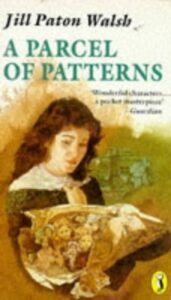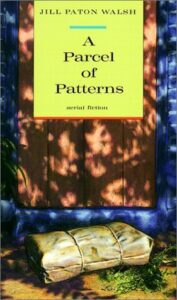Jill Paton Walsh (1937-2020) was very good at historical fiction for young readers and we used to promote, teach and use her work a lot in the schools I taught in. I remember pouncing on A Parcel of Patterns with glee when it was published in 1983.
It is set in Eyam in 1665. That’s the Derbyshire village which famously locked down when it was unaccountably afflicted with plague as an altruistic way of preventing its spread. It may have reached Derbyshire in a packet of cloth patterns ordered from London by the local tailor. Today, the history is clearly presented in Eyam Museum which opened in 1994.
Paton Walsh’s narrator is Mall Percival who has to see most of her family, friends and neighbours succumb to, and die from, the most hideous imaginable disease. She’s a powerfully drawn young woman and passionate as she falls in love with a boy from the next village. They run a sheep rearing business together but, of course, she cannot see him once Eyam seals itself off although they do eventually get a short-lived happy ending. She introduces us to two parsons and, incidentally, we learn about the divisions in a country which has recently been through the execution of a king, eleven years of Puritan rule and the restoration of the monarchy with all the religious tensions, contradictions and changes these events have brought. Is the plague God’s will in which case we should simply accept it? Or should we look after ourselves and take common sensible precautions because the Lord helps those who help themselves? Even in 1665 they understood that hygiene, for example, must be a factor in limiting the spread of the disease although of course this is two centuries before the science of bacteriology arrived.

Rereading this powerful little novel now, I’m struck by two things.
First, anyone who writes historical fiction has to decide how to convey the speech mode because it would be very different from today. If we could hear a recording of Derbyshire people speaking English in 1665 we would probably struggle to understand it. Pronunciation changes over time and so does everyday vocabulary. I’ve thought about this a lot lately because in a small way I’ve been dabbling in historical (sort of) fiction myself. Paton Walsh’s solution is to pepper her dialogue with old pronouns (thee and thou) and expressions such as “none this se’-nnight” (this week) or “that would be fine spite on them”. And she makes Mall uses words and expressions such as “casement” and “most heartily implored”.
Worthwhile and interesting as this novel is, in 2025, this feels like a rather cumbersome, dated way of ensuring that we never forget the period we’re reading about.
Second, of course, we’ve been through a global pandemic since I last read A Parcel of Patterns. Paton Walsh’s Mall and other characters note, without understanding the reasons, that some people don’t catch the plague at all despite being exposed to it. And some people get it mildly and recover. No one really understands anything except that all the laws of normal social interaction are overturned. It all sounds very familiar doesn’t it? Their terror rings true too, along with the contradictory advice they get and the scepticism and/or resignation as well as the occasional act of selfless heroism. It’s quite a novel for our times especially considering it was written 37 years before Covid. Moreover it describes something which happened nearly four centuries ago thereby linking the two events although obviously that wasn’t her intention.
Well worth going back to.

Next week on Susan’s Bookshelves: The Power of Music by Sheku Kanneh-Mason